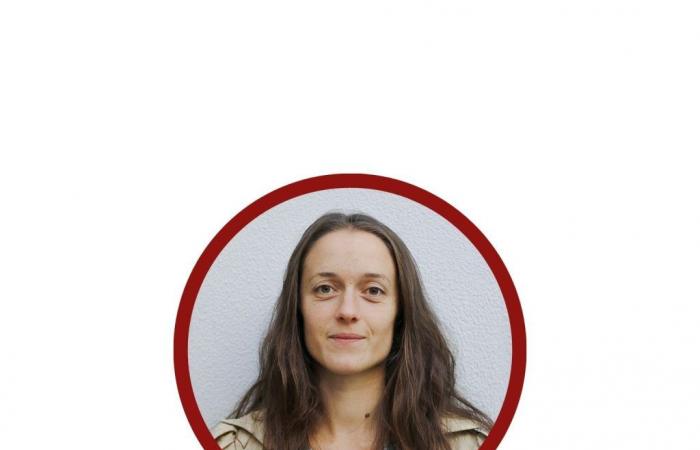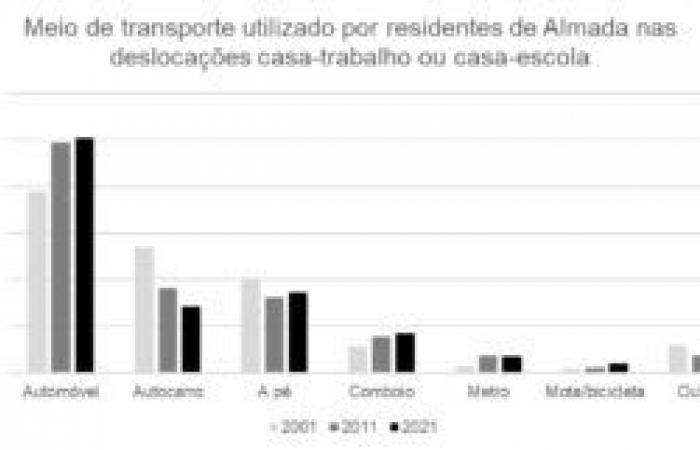Inês Sarti Pascoal, specialist in sustainable urbanism and spatial planning
After 50 years of Freedom, there have been important advances in sustainable mobility in our municipality, with the 25 de Abril Bridge train, the surface metro and the metropolitan navigator. Even so, the use of cars in daily travel by people residing in Almada has been increasing. A mobility policy with a vision of sustainability is necessary, coherent in its measures and participated by the population, so that people have real freedom in choosing their means of transport.
What sustainable mobility milestones have been notable in recent decades? Here I leave three with very important impacts on the territory of Almada.
Firstly, the railway crossing at Ponte 25 de Abril, which connects Lisbon with Setúbal by train. Having been inaugurated in 1999, in 20 years of service, Fertagus had already transported 390 million passengers, removing 62 million cars from the Bridge and avoiding the emission of 780 thousand tons of carbon dioxide, a fundamental indicator given the climate emergency we are experiencing. .
Second place goes to the light surface metro, operated by Metro Transportes do Sul (MTS), since 2007, which in 15 years, transported 174 million passengers, connecting some parishes in the municipality of Almada and even Corroios, in the neighboring municipality. .
Thirdly, the metropolitan navigator, through Transportes Metropolitanos de Lisboa (TML), which since 2019 has allowed the entire population to access a public transport pass, to travel through all 18 municipalities in the Lisbon Metropolitan Area, for just 40 euros per person or 80 euros for families. It is an environmentally and socially fair measure that, in five years of operation, already covers 800 thousand passes charged per month.
Has this incentive for sustainable transport been enough? Seeing the glass as half full, it seems that we are moving towards sustainability, providing public transport to the population, and with large numbers of users using the services. But we can see the same glass as half empty when we look at global statistics.
What the 2021 Census reveals to us is that in recent decades, the population of Almada that travels by car has been constantly increasing, by bus has been decreasing considerably, by train and metro with a slight increase. There are fewer people walking, and bicycles/motorcycles have a negligible value compared to other means of transport.
What mobilities have been promoted in the last 50 years?
Portugal’s focus has been on the highway and the exclusion of the railway. Municipal investment has also been made in the field of automobile mobility, with a focus on paving roads, creating roundabouts, supporting the widening of highways, and condescending to illegal parking on sidewalks.
Of course, there is the notion that Almada is a dispersed territory, with a low density of residents in various locations, which can make it difficult to implement sustainable transport services. But what is a fact is that in this same municipality there is an abundance of roads for cars which, in fact, further fragment the territory and increase this urban dispersion, reducing accessibility by other means of transport in a safe way, such as walking or riding. bicycle. It is therefore justified that half of the population of Almada (50.2%) use the car in your daily journeys, as this is the invitation made by the mobility policies and infrastructures that exist.
But do people really want to drive?
The urban infrastructures we have influence our experience of the city and the means of transport we choose to travel around. For me, freedom is being able to move in a sustainable way, whether on foot, by bicycle or public transport, choosing what best suits each trip. But this is not always viable, for the route I have to take. Looks like I’m not the only one: a study released this week, the Bicycle Barometerpoints out that many people would be available to ride a bike, if there were safety conditions.
A Climate Basic Law indicates that local authorities must have Sustainable Urban Mobility Plans, and states that people have the right to participate in the processes of drafting and reviewing climate policy instruments. Where is Almada’s mobility plan? How can the population participate in the development of these local policies?
In 50 years of April 25th, do we have the freedom to move as we wish, or are we dependent on a mobility system that has been imposed on us?
Metro Sul do Tejo for when?









